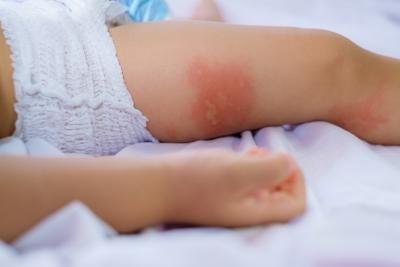What Parents Should Know About Food Allergies in Children

Food Allergies in Children
Food allergies are immune system-driven undesired bodily reactions to specific food. Certain food allergies are more likely to be outgrown (such as cow’s milk and eggs), in contrast to certain food allergies (such as nuts or seafood) which are less likely to be outgrown.
What Causes Food Allergies in Children?
A strong family history of food allergies increases the chance of food allergies in a child, suggesting that there is a genetic component involved. Certain environmental factors may also play a role, including delayed introduction of solid foods into the child’s diet. This is why the introduction of foods, including so-called “allergenic” foods like eggs and peanuts, should not be delayed beyond 4 to 6 months of age.
How Do I Know If My Child Has A Food Allergy?
When there is a true food allergy, your child may experience the following symptoms very quickly (within 30 minutes) after consuming the culprit food:

- Wheezing, shortness of breath, chest tightness
- Sudden bad coughing or a ‘lump in throat’ sensation
- Hives (also known as urticaria)
- Itchy rashes around the mouth area
- Swelling of the eye/lip/tongue
- Sudden vomiting with abdominal pain and/or diarrhoea However, it is important for parents to note that the most common cause of acute vomiting with abdominal pain is still food poisoning or acute gastroenteritis.
- Sudden nasal symptoms (itchy nose, sneezing or blocked nose)
The diagnosis of food allergies can be confirmed based on a good history from the patient or the parents, as well as with the assistance of skin prick tests or blood tests. These tests can also be used later on to predict the chances of the child outgrowing the food allergy.
The standard treatment advice is careful avoidance of the food allergen. Immunotherapy is available for certain food allergies such as peanuts and eggs but the child should preferably be 5 years old and above. This treatment can only be done by a paediatrician sub-specialising in allergy, with the appropriate facilities in place.
If the exposure to specific foods clearly resulted in a reaction, your child should avoid the suspected food and consult a paediatrician as soon as possible.
When there are uncertainties or doubts about a specific food causing the reaction, it would be helpful to keep a food diary, which may help to indicate a hidden ingredient in the food that is causing the reaction. Bring the food diary along for the consultation with the doctor, as it will be useful in the diagnostic process.
Try not to label your child with multiple food allergies without a proper diagnosis by a paediatrician to avoid the risk of malnutrition from excessive food avoidance.
Breastfeeding is the best way to feed your infant and exclusive breastfeeding is recommended for at least 4 months and up to 6 months of age as it is least likely to trigger an allergic reaction, is easy to digest and strengthens your baby’s immune system. Breast milk may also reduce the incidence of cow’s milk protein allergy, atopic dermatitis and early onset of wheezing.
If breastfeeding is not possible, a standard cow’s milk based formula can be given. If you suspect your baby has cow milk’s allergy, consult your child’s paediatrician as soon as possible. Avoid putting your child on a dariy-free diet without the advice of your child’s paediatrician.
Introducing Solid Foods and Watching for Allergic Reactions
The introduction of solid foods usually begins from 4 to 6 months of age but this varies from child to child, depending on their developmental readiness.
Your baby may be ready for solid foods when he or she:
- Is able to sit up
- Has sufficient head and neck control
- Loses the tongue-thrust reflex that pushes food back out
- Tries to reach out to grab food
Timing of certain foods should also be considered when introducing solid foods to your baby. Try introducing these single ingredient infant foods to your baby one at a time, every 3 to 5 days:
- Rice or oat cereal
- Yellow and orange vegetables (sweet potato, squash and carrots)
- Fruits (apples, pears and bananas)
- Green vegetables
- Age-appropriate stage-based foods with meats
This slow process can give you the chance to identify and eliminate any food that may cause an allergic reaction. Do note that certain acidic foods (e.g. berries, tomatoes, citrus fruits and vegetables) may cause rashes around the mouth but this is commonly due to irritation from the acid in the food and not from an allergic reaction to the specific food.
You may read more on Weaning Your Baby onto Solids.
Should I Introduce Highly Allergenic Solid Foods to my Baby?
Highly allergenic foods can be introduced to your baby between 4 and 6 months of age, just as you would introduce any other solid foods. Highly allergenic foods that you can feed your baby include:
- Dairy products such as cheese, yogurt or cow’s milk protein formula (not whole cow’s milk to drink due to nutrition reasons not related to allergies)
- Eggs
- Soy
- Wheat
- Peanuts and tree nuts in a form of butter or paste (not whole peanuts or tree nuts due to choking risk)
- Fish and shellfish
You may want to be cautious when introducing your baby to highly allergenic solid foods. One safe way to do this is to introduce the first tastes at home rather than at day care or a restaurant. You should introduce highly allergenic foods to your baby after other solid foods have been fed and tolerated, and with the first taste being at home. If no reaction occurs, then you can gradually increase the amount at a rate of 1 new food every 3 to 5 days.
You should to talk to your baby’s paediatrician before introducing a highly allergenic food for the following situations:
- If your infant has had an allergic reaction to a food or has a known food allergy
- If you think your infant has a food allergy
- If your infant has persistent, moderate to severe atopic dermatitis despite recommended treatment
- If your infant’s sibling has a peanut allergy
- If your infant has positive blood tests or skin prick tests to food(s).
Some infants will develop food allergies regardless. Thus, if there is an allergic reaction to any food, that food should be stopped and you should seek advice from your child’s paediatrician. Your child’s paediatrician may refer him/her a paediatric allergist/immunologist for further evaluation, depending on the clinical situation.
SUMMARY
While the causes of food allergies are unknown, it has been suggested that family history and environment factors contribute to a child developing food allergies.
After consuming the food allergen, children with food allergies may experience shortness of breath, wheezing, swelling of the mouth area, hives, vomiting or other symptoms.
Food allergies can be diagnosed through skin prick tests and blood tests, which can be done by a paediatrician sub-specialising in allergies.
Avoid suspected food allergens and help your child keep a food diary to track your observations. If you are unsure, consult your child’s doctor for a diagnosis.
Exclusive breastfeeding for babies up to 6 months of age strengthens the immune system and may reduce the incidence of eczema, wheezing and cow’s milk protein allergy.
When introducing highly allergenic solids foods, do it at home for the first time and gradually increase this at 1 new food every 3 to 5 days.


